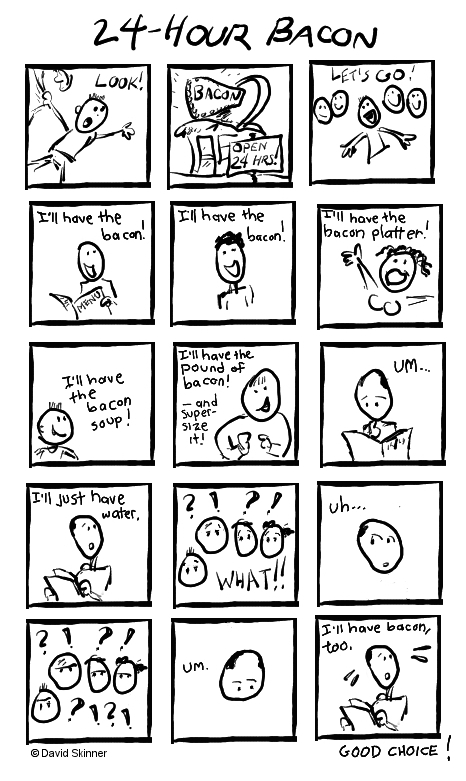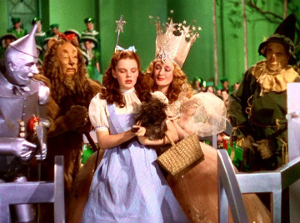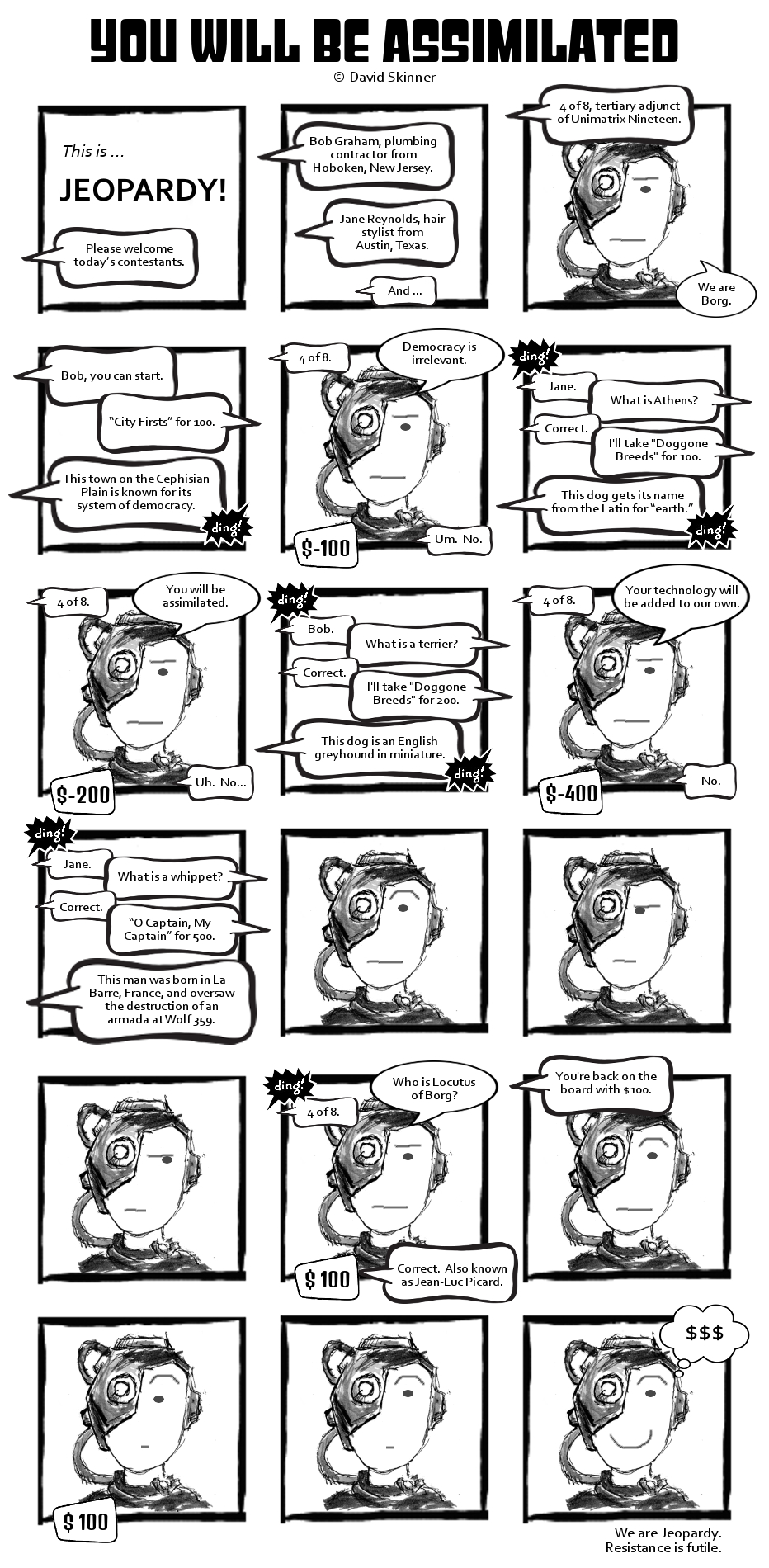Mermaids & Termites
As of July
Wednesday, July 6, 2022 2:35 pm
There's no two ways about it. I am capricious. Every few weeks I have a new plan for what I want to do. I can't stick to anything.
Honestly, these posts should just be updates about what has happened, not what may. I have no idea, really, what I'll be doing in a month.
So what has happened?
Honestly, these posts should just be updates about what has happened, not what may. I have no idea, really, what I'll be doing in a month.
So what has happened?
The "Arts Community"
Count Me Out
Tuesday, July 5, 2022 12:14 am
There are many reasons I did not become an illustrator or painter. Oh, I had the talent. I truly did. I just needed the development.
But I couldn't stand the artists.
But I couldn't stand the artists.
You Will Be Assimilated
My Career as a Cartoonist
Tuesday, May 12, 2020 10:33 pm
Recently I noted that I have, on occasion, attempted to make clever-funny comics. Prompted by that note I have finally finished a certain comic, the rough pencil sketch of which has been stashed near my desk for years.
Since there is a lot of talking in the comic, I didn't directly ink the text. The text and layout and so on were done on PC (in GIMP). I did draw the one character, in ink and water (using nib and brush). I then scanned the drawing and integrated it with the layout.
My scanner is so old — an Epson Perfection 1200U — that a driver hasn't been released since Windows XP. Luckily I can use one of the later Epson drivers, although there's a bit of jiggering to do so. I thought it was already installed on my PC but apparently my Windows 7 64-bit forgot it was there, and I had to reinstall. Bothersome.
To keep the comic legible I had to make it too big to fit in the normal column of this blog. The image will overlap to the right but should be fine on most browsers. If not so on yours, download the image (via right-click) and view it elsewise.
Enjoy!
Since there is a lot of talking in the comic, I didn't directly ink the text. The text and layout and so on were done on PC (in GIMP). I did draw the one character, in ink and water (using nib and brush). I then scanned the drawing and integrated it with the layout.
My scanner is so old — an Epson Perfection 1200U — that a driver hasn't been released since Windows XP. Luckily I can use one of the later Epson drivers, although there's a bit of jiggering to do so. I thought it was already installed on my PC but apparently my Windows 7 64-bit forgot it was there, and I had to reinstall. Bothersome.
To keep the comic legible I had to make it too big to fit in the normal column of this blog. The image will overlap to the right but should be fine on most browsers. If not so on yours, download the image (via right-click) and view it elsewise.
Enjoy!
24-Hour Bacon
My Career as a Cartoonist
Sunday, May 3, 2020 4:02 am
Many thousands of years ago, given that I have something of a talent for art and (maybe) for humor, I tried making some clever-funny comics. Not many have survived. I unearthed this one an hour ago. It was drawn with ink and brush. There was a bit of photo-duping and keylining (e.g., you can see that the frame outlines are all the same). It's amusing.


Close to the Heart
On the Occasion of Neil Peart's Death
Thursday, February 6, 2020 3:26 pm
While it is not unreasonable to wonder about the life of an artist — or even to admire an artist's everyday conduct — I am of the mind that the artist does not matter (beyond his getting the proper credit and payment). To be sure, his life is relevant insofar as it clarifies his work; but other than that...
Most artists are scum. Beethoven was a bitter bastard. Shostakovich was a pathetic collaborator. As men, neither merits celebration. Celebrity for artists should be rejected. Go ahead and admire Haydn because he was kind, pious, and hard-working; then pity and decry him because he was adulterous; but remember that there were many kind, pious, hard-working, and adulterous men in the world. It was not Haydn's life that distinguished him; and it is not his life that should concern us.
Most artists are scum. Beethoven was a bitter bastard. Shostakovich was a pathetic collaborator. As men, neither merits celebration. Celebrity for artists should be rejected. Go ahead and admire Haydn because he was kind, pious, and hard-working; then pity and decry him because he was adulterous; but remember that there were many kind, pious, hard-working, and adulterous men in the world. It was not Haydn's life that distinguished him; and it is not his life that should concern us.
Favor the Heart Over the Tail
Hacksaw Ridge Is an Amazing 40 Minutes
Tuesday, November 28, 2017 9:14 pm
Beware! Spoilers follow.
 For its first hour or so, Hacksaw Ridge is very disappointing. For another half hour it is active, if not exciting. And then there is a scene that is transcendent; and the remainder of the movie is wonderful.
For its first hour or so, Hacksaw Ridge is very disappointing. For another half hour it is active, if not exciting. And then there is a scene that is transcendent; and the remainder of the movie is wonderful.

That's Where You'll Find Me
 There's a misalignment in The Wizard of Oz.
There's a misalignment in The Wizard of Oz.
What is its moral? "There's no place like home." Dorothy has found herself in a land over the rainbow, and yet her ultimate desire — the fulfillment of which she asks of the Wizard — is to return to Kansas. Near the end, Glinda prompts Dorothy to articulate the lesson that she, Dorothy, has learned; and Dorothy replies:
Maybe Dorothy Sings About the Wrong Thing
Saturday, August 12, 2017 12:19 pm

What is its moral? "There's no place like home." Dorothy has found herself in a land over the rainbow, and yet her ultimate desire — the fulfillment of which she asks of the Wizard — is to return to Kansas. Near the end, Glinda prompts Dorothy to articulate the lesson that she, Dorothy, has learned; and Dorothy replies:
If I ever go looking for my heart's desire, I won't look any futher than my own backyard. Because if it's not there I never lost it to begin with.This lesson, of course, accords with the narrative facts that the Scarecrow, the Tin Man, and the Cowardly Lion each already had the thing he sought. The Scarecrow was already brainy; the Tin Man, full of heart; the Lion, courageous. And Dorothy, in Kansas, already had the place most free of trouble: her home with Aunt Em and Uncle Henry.
© 2004-26 David Skinner · All rights reserved
